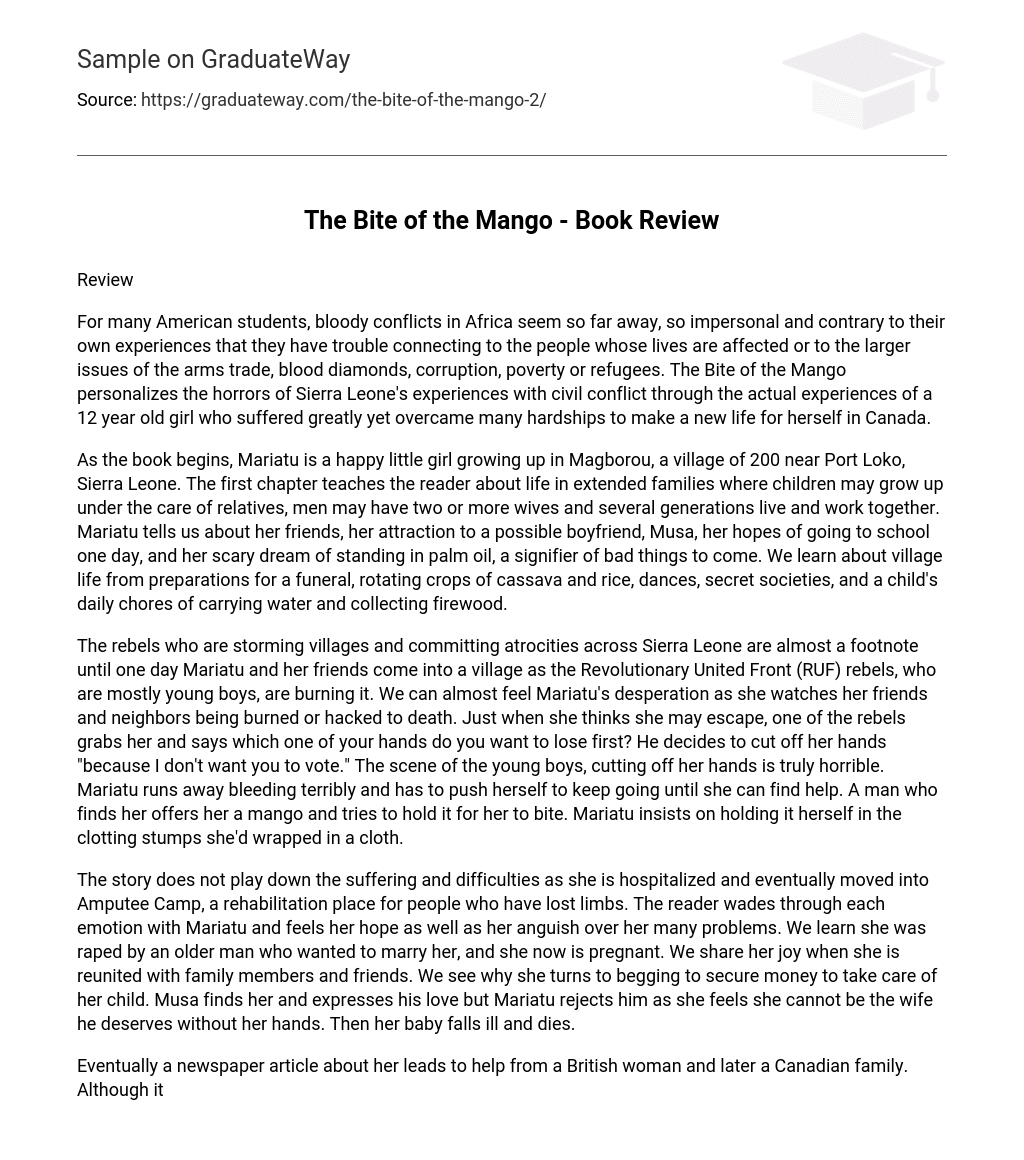Review
For many American students, bloody conflicts in Africa seem so far away, so impersonal and contrary to their own experiences that they have trouble connecting to the people whose lives are affected or to the larger issues of the arms trade, blood diamonds, corruption, poverty or refugees. The Bite of the Mango personalizes the horrors of Sierra Leone’s experiences with civil conflict through the actual experiences of a 12 year old girl who suffered greatly yet overcame many hardships to make a new life for herself in Canada.
As the book begins, Mariatu is a happy little girl growing up in Magborou, a village of 200 near Port Loko, Sierra Leone. The first chapter teaches the reader about life in extended families where children may grow up under the care of relatives, men may have two or more wives and several generations live and work together. Mariatu tells us about her friends, her attraction to a possible boyfriend, Musa, her hopes of going to school one day, and her scary dream of standing in palm oil, a signifier of bad things to come. We learn about village life from preparations for a funeral, rotating crops of cassava and rice, dances, secret societies, and a child’s daily chores of carrying water and collecting firewood.
The rebels who are storming villages and committing atrocities across Sierra Leone are almost a footnote until one day Mariatu and her friends come into a village as the Revolutionary United Front (RUF) rebels, who are mostly young boys, are burning it. We can almost feel Mariatu’s desperation as she watches her friends and neighbors being burned or hacked to death. Just when she thinks she may escape, one of the rebels grabs her and says which one of your hands do you want to lose first? He decides to cut off her hands “because I don’t want you to vote.” The scene of the young boys, cutting off her hands is truly horrible. Mariatu runs away bleeding terribly and has to push herself to keep going until she can find help. A man who finds her offers her a mango and tries to hold it for her to bite. Mariatu insists on holding it herself in the clotting stumps she’d wrapped in a cloth.
The story does not play down the suffering and difficulties as she is hospitalized and eventually moved into Amputee Camp, a rehabilitation place for people who have lost limbs. The reader wades through each emotion with Mariatu and feels her hope as well as her anguish over her many problems. We learn she was raped by an older man who wanted to marry her, and she now is pregnant. We share her joy when she is reunited with family members and friends. We see why she turns to begging to secure money to take care of her child. Musa finds her and expresses his love but Mariatu rejects him as she feels she cannot be the wife he deserves without her hands. Then her baby falls ill and dies.
Eventually a newspaper article about her leads to help from a British woman and later a Canadian family. Although it is complicated with many turns, eventually Mariatu goes to Canada and settles into life in Toronto with a Sierra Leonean family. Yet as with many refugees, life is far from perfect. There are issues of language, schooling, cultural differences, and prosthetics for her missing hands. Yet Mariatu once again demonstrates her inner strength and determination as she works hard to overcome life’s difficulties.
Although I read the Bite of the Mango on a snowy winter day here in Columbus, Ohio, it took me back to the heat and monsoon rains I experienced during my two years in Sierra Leone as a Peace Corps volunteer teacher. The village and family scenes brought back the power of relationships in my students’ lives. Mariatu’s openness about her travails reminded me of the hope so many Sierra Leoneans have expressed to me about their own futures and the future of their country.
The book possesses the ability to get to the heart of the matter (apologies to Graham Greene)– the many positive attributes of Sierra Leoneans who have faced one of the nastiest internal conflicts of the 20th century. Teachers can use The Bite of the Mango to explore village life, extended families, and the horrors of war. It can be used to teach the eternal theme of how people, especially children, are able to overcome adversity and as a comparative story of a young person caught in war.
Mariatu Kamara and Susan McClelland have created a memorable book. The theme is a global one, which has meaning not only for thousands of displaced people across the planet but for the millions more who have refugees being resettled in their communities. Although the violence of the book may make teachers think twice about using it, this is an honest and true story told without glamour or artifice. In a time when Americans students watch the made-up violence of CSI and 24, teachers would do well to teach them about how people respond to real-life horrors going on not so far away.
Perhaps then our next generation will be more committed to peace keeping and more aware of how our purchases here (of blood diamonds or drugs for example) may be funding atrocities abroad. I cannot imagine anyone reading The Bite of the Mango and not rethinking the lives of refugees who come to America. Highly recommended! Copyright Africa Access 2009





